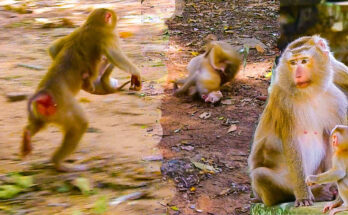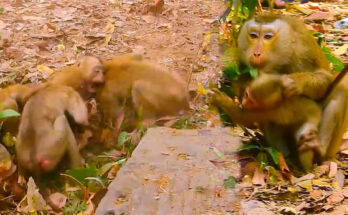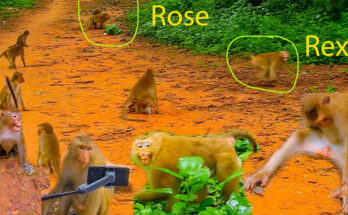Heartbreaking! Baby Monkey Alone Looking for Mother, Hungry and Scared
In the dense jungle, where life is a constant struggle and survival often depends on the safety of a family, the plight of a tiny baby monkey wandering alone is truly heartbreaking. This little creature, no more than a few weeks old, found itself separated from its mother — vulnerable, hungry, and utterly scared.
The baby monkey’s story began on a day like any other, when the troop was moving through the forest searching for food. In the chaos of the thick underbrush and the urgency of the journey, the little one somehow got left behind. Perhaps frightened by a sudden noise or a predator’s approach, it slipped away, lost in a vast world that suddenly felt enormous and unforgiving.
Alone, the baby monkey’s wide eyes scanned the unfamiliar surroundings. Every rustle, every shadow was a cause for fear. Its tiny body trembled as hunger gnawed relentlessly at its belly. The soft cries that escaped its lips echoed through the trees — faint, fragile calls for a mother who was nowhere to be found.
The forest, usually a place of shelter and family, now seemed a daunting wilderness. The baby monkey tried to climb the trees, reaching for the familiar embrace of a mother’s arms or the comforting warmth of the troop. But there was no answer, only silence and the distant sounds of animals going about their daily lives.
Time passed, and the little monkey’s situation grew more desperate. Its small frame was weak from lack of food and exhaustion. It clung to a branch, shivering not just from cold but from fear. The loneliness was overwhelming. Without the nurturing care of its mother, the baby’s chances of survival were perilously slim.
Foraging was impossible alone. The baby had not yet learned how to find the fruits, leaves, or insects that the troop relied on. It reached out, touching leaves and bark uncertainly, but there was no sustenance to be found. Hunger pains made it cry louder, a raw, piercing sound that seemed to plead for help.
Other animals in the forest noticed the lone baby. A few birds chirped curiously, some insects crawled nearby, but none offered assistance. The baby monkey’s plight was one that could easily be overlooked in the harsh cycle of nature, where only the strongest survive.
Meanwhile, the troop moved on, unaware or unable to find their lost member. The mother monkey’s heart must have been breaking, her calls growing frantic as she searched desperately. But the jungle was vast, and the chances of reunion were slipping away with each passing hour.
In this heartbreaking scene, the baby monkey’s innocence stood out starkly against the wild backdrop. It was a fragile life caught in the cruel reality of the forest — a poignant reminder of the vulnerability of the youngest and smallest creatures.
But even in such despair, nature sometimes offers hope. A kind-hearted forest ranger, patrolling nearby, heard the baby’s cries. Guided by the faint sounds, the ranger found the trembling monkey, its eyes full of fear yet flickering with a spark of trust upon seeing a gentle human presence.
The ranger carefully approached, offering water and food, soothing the scared infant with soft words and gentle hands. This moment marked the beginning of a possible rescue, a chance to give the baby monkey a new hope.
The baby monkey, once lost and alone, now had a chance to survive and heal. But the image of that little creature searching helplessly for its mother — hungry, scared, and so small against the vastness of the jungle — remains a deeply moving and painful reminder.
This story resonates beyond the forest. It calls attention to the fragility of life, the importance of family bonds, and the impact of separation in the animal world. It also inspires compassion, reminding us that sometimes, even the smallest voice needs to be heard and helped.
In the end, the baby monkey’s journey reflects the universal need for love, security, and belonging. It is a heart-wrenching tale, but one that also holds the possibility of rescue, hope, and the enduring power of care—whether from mother, troop, or human hands willing to protect the vulnerable.


